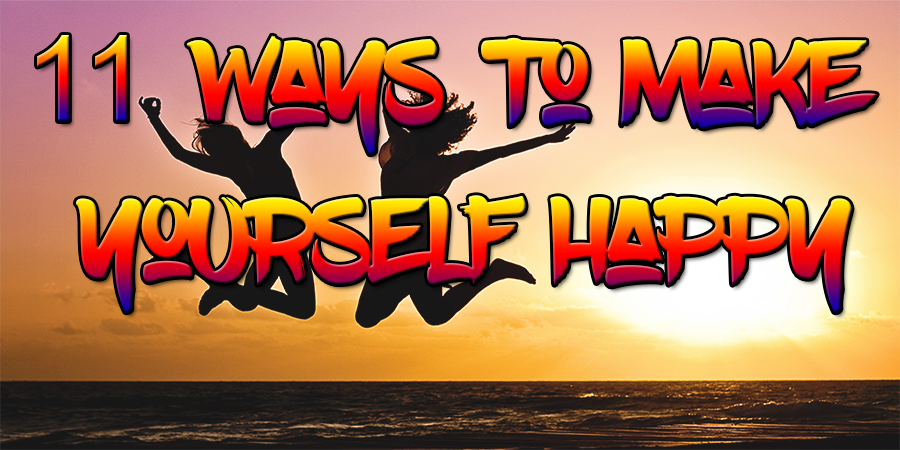I was perusing Facebook yesterday when I across a post from a friend that said, “My 6-year-old asked me ‘How do I make myself happy?’ I told her ‘If only I knew’.” Now, I suffered from debilitating depression for years when I was younger, but since then I’ve learned how to make myself happy regardless of what’s going on in my life. I wondered, “Are there people who really don’t know how to make themselves happy?” So here’s a list of 11 ways to make yourself happy, no matter what. Use them all for the best outcome. Each one is a tool in your arsenal.
1. Be Grateful
No matter what problems are going on, there is plenty to be grateful for. Make a long list of everything you’re thankful for, and review it every time you start feeling blue. I’m grateful I have fresh air to breathe (think of Beijing), that I’m not locked up in solitary confinement in a prison, that I have food to eat, that I live in America, that I have the freedom to go where I want went I want (think of a woman born in Saudi Arabia), that I have shelter and food to eat. I’m grateful my car works. And on and on. If you’re in such a funk that you ask yourself, “What am I grateful for?” but all you can come up with is, “Nothing!”, ask yourself, “If I wanted to be grateful for something, what would it be?”. Reviewing all that I am thankful for always makes me feel better. How about you?
2. Focus on the Moment
Eckhart Tolle and Thich Nhat Hanh are a couple of the many people who talk about mindfulness. Mindfulness is about being in this moment, instead of thinking about what’s passed or what has yet to come. Just take time to fully notice everything that’s happening right this minute. Use all your senses. Many people choose not to be happy in the moment because they’re worried about what is done and over with or worried about what might happen in the future. Take time to be in this moment, right here right now. Are you okay? Chances are you are.
3. Visualize Yourself Being Happy
 Did you know that your brain cannot distinguish between an event that happens externally versus one that happens internally? Well, of course it can identify what’s external and what’s internal, but when you visualize or imagine something, your brain activates the exact same physiologic processes as if you were experiencing it for real. Scientists have studied this phenomenon, especially in the case of athletes. When an athlete imagines performing a particular sport skill, his muscles fire in the same sequence they would if he were actually performing the skill. Mental imagery of fearful responses trigger the same physiological responses as if the fearful event was actually occurring – neurotransmitter and hormone release, increased respiration and heartbeat, depressing the immune system, etc. Furthermore, imagining a movement or situation has been shown to re-wire neural pathways in the brain to support the imagined scenario. The same goes for other imagined states, like happiness. Your physiology changes in response to the imagery just as it would if the imagined scene were real1,2,3,4.
Did you know that your brain cannot distinguish between an event that happens externally versus one that happens internally? Well, of course it can identify what’s external and what’s internal, but when you visualize or imagine something, your brain activates the exact same physiologic processes as if you were experiencing it for real. Scientists have studied this phenomenon, especially in the case of athletes. When an athlete imagines performing a particular sport skill, his muscles fire in the same sequence they would if he were actually performing the skill. Mental imagery of fearful responses trigger the same physiological responses as if the fearful event was actually occurring – neurotransmitter and hormone release, increased respiration and heartbeat, depressing the immune system, etc. Furthermore, imagining a movement or situation has been shown to re-wire neural pathways in the brain to support the imagined scenario. The same goes for other imagined states, like happiness. Your physiology changes in response to the imagery just as it would if the imagined scene were real1,2,3,4.
So make use of your imagination. Visualize yourself feeling happy. Imagine you are someplace or with someone who supports a happy state of being. Pay attention to your body and how it feels in various areas (face, breathing, back, etc).
4. Change Your Physiology
Our bodies have a lot to do with how we feel, and you can put yourself in a happy state if you change your physiology. If you think about a depressed person, how would you describe their physiology? To be depressed, you have to have a frown, or at least relaxed facial muscles. Usually they sit or stand with their shoulders slumped forward. They breathe shallow breaths. They talk slowly, often in a low tone. If, however, you mimic the physiology of happiness, you go a long way to actually feeling happy. Make sure you check these:
a. Smile
Even if you don’t feel like it, smile. There are 43 muscles in your face, and studies have shown that smiling actually causes a person to feel happier. “I’m not saying that all moods are due to changes in the muscles of the face, only that facial action leads to changes in mood,” said Dr. Robert Zajonc, a psychologist at the University of Michigan5. A study at the University of California San Francisco tested depressed women. Just by having the women smile, they reported improvement in their overall mood. In addition, look up toward the ceiling. Looking upward also boosts your mood.
b. Stand or Sit Up Straight
Depressed people often hunch forward, but happy people stand up straight with their shoulders back. Try it and see how it boosts your mood.
c. Breathe Deeply
Most yoga practices teach a pattern of deep breathing, and studies have shown that breathing deeply makes you feel happier, more peaceful, and have a better sense of well-being. Depressed people usually take short, shallow breaths. Instead, breathe down deep into your diaphragm.
d. Talk Faster and Use Gestures
Depressed people often talk in a slow manner in a low, monotone voice. To make yourself feel happier, talk a bit faster. Vary your pitch up and down. Gesture with your hands when you talk. Remember how someone who’s really happy or passionate talks. Emulate that.
e. Exercise
I hate to exercise. There, I said it. However, I love how I feel after I exercise. So I make myself do it anyway. Everyone knows how good exercise is for your health and well-being, but it also releases feel-good neurotransmitters and hormones. Try to find something you like (or at least something you don’t really hate to do), and get moving for at least 20 minutes a day, 5 days a week. Your mood will improve.
f. Watch Your Diet
Eating junk food, sugary items, dyes, preservatives, and food-grade chemicals can really affect your mood. Have you met people who get all out-of-whack if they drink pop or eat Red Dye #40? Much of the food in the supermarkets isn’t even real food, and it can definitely affect your mood (not to mention your health). Try eating more healthy, natural foods and skip the sugar and junk.
5. Sleep Enough
Everyone is different, and only you know how much sleep you need to feel good the next day. But watch out. If you’re depressed, you might sleep too much. In that case, make yourself get up and do things after 8 hours of sleep.
6. Choose What You Focus On
At any given time, your body is receiving lots of information from your 5 senses, but you can choose what you focus on. Say you go to a party. There are people having fun, and there are people fighting and having what seems to be a miserable time. You like the food but you hate the music. You choose whether you want to focus on the bad things or the positive things, and how you feel after the party has everything to do with where you placed your attention.
The same is true in life. Natan Sharansky is a computer specialist who was accused of spying for the U.S. and, as a result, was locked up in solitary confinement in a prison in Russia for 9 years. Instead of succumbing to his miserable plight, he decided to focus on something positive. Every day, he played mental chess against himself, saying: “I might as well use the opportunity to become the world champion!” Then, in 1996 after his release, he beat world champion chess player Garry Kasparov!
You, too, have the opportunity to focus on things that make you feel sad, mad, or frustrated. Or you could make a different choice and focus on things that make you feel happy, peaceful, loving, or blessed. All the data is there for either choice. It just depends on where you look and what you choose to focus on.
7. Ask Yourself Better Questions
Do you ever pay attention to how much chatter goes on in your mind? It never seems to stop. From the time you wake up until you go to sleep, your mind works overtime making comments about everything, asking yourself questions, etc. One neat thing about your brain, however, is that whenever you ask yourself a question, your brain always comes up with an answer, even if it’s fantasy. That’s a great feature because you can ask yourself good questions and your brain will find answers for you.
Examples of Bad Questions |
Examples of Better Questions |
| Why am I so fat? | What can I do today to get slimmer and have fun doing it? |
| Why did he/she do that? | What can I learn from this? |
| Why do these things always happen to me? | What is great in my life right now? |
| Can I really do this? | How can I do this and enjoy it? |
The point is, your brain can find answers to the questions you ask. So ask yourself useful questions, and you’ll get better answers.
8. Change Your Beliefs
A lot of our beliefs hold us back or prevent us from being happy. One belief I think that would help make me happy is believing in a purposeful universe. In this belief, there is a powerful, all-knowing force or Being who wants what is for my highest good. In this kind of universe, events, situations, and people help shape my experiences so that, in the end, I grow and mature in a way that serves my highest good. I want to believe this, so I am always searching for evidence that lends evidence for this belief.
What beliefs would you like to adopt that would make you happier? Which ones do you already have? Strengthen them by researching and looking for evidence that supports these beliefs. What you look for, you will find.
9. Surrender
I read a good book about the power of surrender. It’s called The Surrender Experiment by Michael A. Singer. In the book, he describes how he spent 30 years just going with the flow and letting life proceed according to its own plan, instyead of dictating and controlling events, situations, actions, and people. In the experiment, things worked out really well, and as a result, he lived at ease and at peace. I recommend you read the book.
For many people, however, we always feel like we have to control things and push and fight to enforce our ideas of what should or shouldn’t be on the world. But what if you let go of the idea that you have to be in control all the time? How would your life be easier? How would your mental state be better if you just let go and went with the flow of life? What if it is a purposeful universe, and everything that happens is just to serve you on your path of growth and is, ultimately, for your highest good? Why not give it a try?
10. Do Something Creative
I don’t know if this applies to everyone, or if it’s just me. I love to make something that didn’t exist before. I’m trying to learn to paint. I love to write. I love to just gather scrap wood or scrap materials and build something. When I’m feeling down, it lifts my spirits. If creating something isn’t your thing, what is? Go out and do it. If you don’t know, go try new things til you find that one (or more) activity that makes you happy.
11. Read About People Who Had Every Reason To Be Miserable, But Made A Different Choice
There are so many people in this world who have tons of reasons to be miserable, but instead, they’ve chosen to be happy in spite of their circumstances.
 W. Mitchell had a whole slew of tragic, unfortunate events happen in his life. Among them was a devastating motorcycle crash. He was driving down the highway at 65 mph one day when he looked at something for just an instant. When he looked back at the road, he saw he was about to smash into the back of a semi. To save himself, he rolled his bike, and as a result, he went sliding underneath the truck at 65 mph. The gas cap fell off, and the gas ignited, severely burning over 65% of his body. He lost his fingers and was severely disfigured. But he didn’t want to focus on the extreme physical pain or what he lost, so he chose every day to be happy. He started a company that was later valued at $65 million. Four years later, he was flying his plane when frost on the wing caused it to crash. He was paralyzed from the waist down. They took his toes and sewed them on his hands so that he might be able to grip some things. His wife left him.
W. Mitchell had a whole slew of tragic, unfortunate events happen in his life. Among them was a devastating motorcycle crash. He was driving down the highway at 65 mph one day when he looked at something for just an instant. When he looked back at the road, he saw he was about to smash into the back of a semi. To save himself, he rolled his bike, and as a result, he went sliding underneath the truck at 65 mph. The gas cap fell off, and the gas ignited, severely burning over 65% of his body. He lost his fingers and was severely disfigured. But he didn’t want to focus on the extreme physical pain or what he lost, so he chose every day to be happy. He started a company that was later valued at $65 million. Four years later, he was flying his plane when frost on the wing caused it to crash. He was paralyzed from the waist down. They took his toes and sewed them on his hands so that he might be able to grip some things. His wife left him.
What did he do? He focused on being happy. He ran for mayor with the slogan, “Not just another pretty face” (remember the burns?). He won. He started a radio talk show. He found love in another woman and married again. He made a choice. You have the same choice, as do I.
Nick Vujicic is another individual who had every reason to feel sad. Born without arms or legs, Nick chose happiness. If you haven’t heard him speak, here’s a video:
https://www.youtube.com/watch?v=6kxSrPD__BA
Get inspired. Find people who have had worse challenges than you but who have made the decision to be happy anyway. There are many to choose from.
So as you’ll notice, these are eleven ways to be happy without relying on external people, places, or events. It’s just a choice you make every day. What do you choose?
Footnotes
1. Psychophysiological Changes Accompanying Different Types of Arousing and Relaxing Imagery by Douglas Carroll, John S. Marzillier, Sally Merian.
2. Hyperventilation beyond fight/flight: Respiratory responses during emotional imagery by Ilse van Diest, Winnie Winters, Stephan Devriese, et al.
3. Emotional Imagery: Conceptual Structure and Pattern of Somato-Visceral Response by Peter J. Lang, Michael J. Kozak, Gregory A. Miller, et al.
4. Emotional Imagery: Conceptual Structure and Pattern of Somato-Visceral Response by NFPT CEC.
5. A Feel-Good Theory: A Smile Affects Mood by Daniel Goleman.






